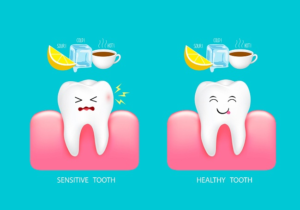Understanding Medicine for Sensitive Teeth: What Works and Why
What is tooth sensitivity?

Dentin hypersensitivity, sometimes referred to as tooth sensitivity, is a common dental condition marked by pain or discomfort in one or more teeth in response to certain stimuli, such as hot, cold, sweet, or acidic meals and beverages. The dentin, the tooth’s underlying layer, becomes exposed and causes this sensitivity. When dentin is exposed, it can respond to temperature changes and other stimuli because it has microscopic tubules that connect to nerves inside the tooth.
What causes tooth-sensitive teeth?
Dentin, the layer that is present beneath the enamel, contains microscopic tubules that lead to the nerve endings in the tooth. When the enamel is compromised, these tubules can become exposed. allowing stimuli such as heat, cold, or sweetness to reach the nerves, causing pain and discomfort. associated with sensitivity.
The most common causes of tooth sensitivity are:
Enamel erosion : Frequent consumption of acidic foods and drinks such as citrus fruits, soda, and even some sports drinks can gradually wear away the enamel, leaving your teeth more vulnerable to sensitivity.
Aging: As we age, enamel naturally wears down. This process can be accelerated by other factors, such as teeth grinding or abrasive toothpaste.
Aggressive brushing: Using a firm-bristled toothbrush and brushing too forcefully might expose the dentin and cause gum recession.
Dental decay: If cavities are left untreated, your teeth’s dentin may become exposed and sensitive.
Teeth cracks: A chipped or cracked tooth may reveal the dentin, causing sensitivity. Stimuli may penetrate through even a little fracture to reach the tooth’s interior nerves.
Teeth grinding: Grinding or clenching your teeth while you sleep can wear down the enamel on your teeth and expose the dentin, which can cause sensitivity.
Gum disease: Having gum disease, or periodontitis, can cause the gums to recede, exposing the root.
part of your tooth which is not protected by enamel, making them highly susceptible to sensitivity.
Types of Medicine for Sensitive Teeth
DESENSITIZING TOOTHPASTE: By regularly using desensitizing toothpaste, you can gradually reduce the sensitivity on your teeth because desensitizing toothpastes contain active ingredients like potassium nitrate or stannous fluoride, which can help block the tubules in the dentin or reduce nerve sensitivity.
FLUORIDE GEL: fluoride gel, which can be applied to your teeth either at home or by a dentist, helps to remineralize the enamel and making it to more resistant to tooth sensitivity.
PRESCRIPTION-STRENGTH TOOTHPASTE: in some cases, over-the-counter desensitizing toothpaste may not strong enough. Dentists can prescribe higher concentration fluoride toothpaste that protects your teeth. These toothpastes are usually used daily and can significantly reduce sensitivity over time.
TOPICAL DESENSITIZERS: If your sensitivity is severe and affecting your daily life, your dentist may apply a topical desensitizer directly to the affected teeth. Topical desensitizer can last for several weeks or even months.
DENTAL BONDING: In some cases of exposed root surfaces or worn enamel, your dentist may apply a bonding agent on your tooth, which will block the dentinal tubules and reduce the sensitivity.
Choosing the Right Medicine for Sensitive Teeth
Selecting the right medicine for your sensitive teeth depends on the severity of your sensitivity, the underlying cause, and your lifestyle. Here are a few tips to help you make an informed
decision.
Consult your dentist. If you’re unsure about what’s causing your sensitivity or if over-the-counter options aren’t working, consult your dentist. They can recommend the best treatment based on your specific needs.
Start with desensitizing toothpaste.
For mild to moderate sensitivity, starting with a desensitizing toothpaste is a good step. It’s easy to incorporate into your daily routine and is often effective over time.
Consider professional treatments.
If your sensitivity is more severe, or if you’re looking for longer-lasting relief, professional Treatments like fluoride varnishes, topical desensitizers, or dental sealants may be more appropriate
Maintain good oral hygiene.
Regardless of the treatment you choose, maintaining good oral hygiene is crucial. Regular Brushing with a soft bristled toothbrush, flossing, and using fluoride mouthwash can help. prevent sensitivity from worsening.
Home remedies for managing sensitive teeth
If you are experiencing discomfort for sensitivity and looking for quick relief from pain or discomfort Here are some home remedies that you can try at home;
Salt water rinse
A simple saltwater rinse can help soothe sensitive teeth and gums. Saltwater has a natural antibacterial properties that can reduce inflammation and promote healing in the mouth. To Use this remedy. Dissolve 1 teaspoon salt in a glass of warm water, and rinse your mouth twice a day using this solution.
Honey and warm water
Because of its antimicrobial and anti-inflammatory qualities, honey is a helpful at-home treatment for sore teeth. It can aid with pain relief and gum healing. Use a tablespoon of honey and some warm water to apply this treatment. For a few minutes, swish the solution in your mouth, paying special attention to the afflicted areas. Repeat this twice a day until the discomfort subsides.
Clove oil
Because clove oil possesses analgesic and antimicrobial qualities, it has been used for generations as a natural treatment for dental discomfort. It can lessen sensation and help numb the affected area. Apply a tiny bit of clove oil to a cotton ball or clean your fingertip to apply this cure. Apply it gently to the gums or the tooth that is sensitive. After letting it sit for ten to fifteen minutes, wash your mouth with water. As needed, repeat once or twice a day.
Turmeric paste
Turmeric is known for its anti-inflammatory and antibacterial properties, making it a beneficial remedy for oral health. To use this remedy, mix 1 teaspoon of turmeric powder with a small amount of water to form a thick paste. Apply the paste directly to the sensitive areas of your teeth and gums. Let it sit for 5–10 minutes, then rinse your mouth with water. You can use this remedy once a day.
Conclusion:
Although tooth sensitivity can be a difficult problem, it is treatable with the correct care. There are numerous choices available to assist you in finding relief, ranging from professional treatments to over-the-counter mouthwashes and toothpaste. The best course of action is to collaborate with your dentist to identify the reason behind your sensitivity and create a customized treatment plan. You can lessen or even completely eradicate dental sensitivity and comfortably consume your favorite foods and beverages with the right treatment and medication.


